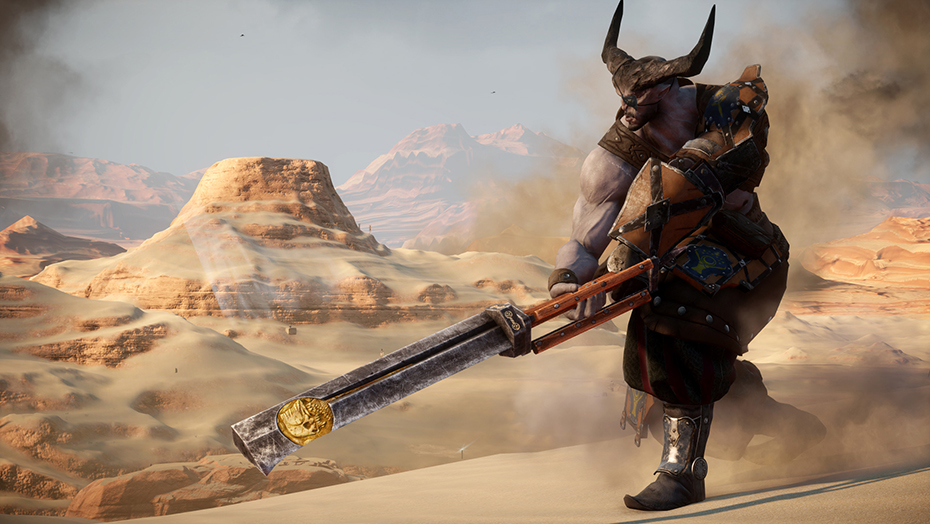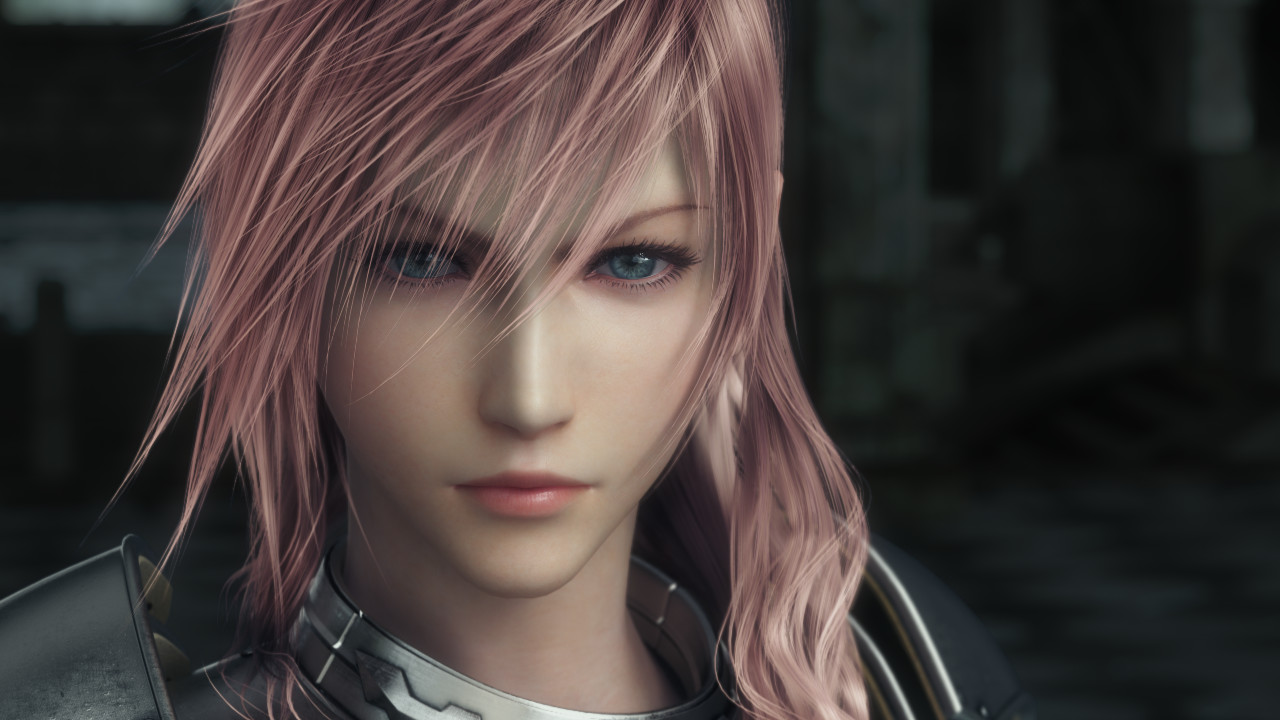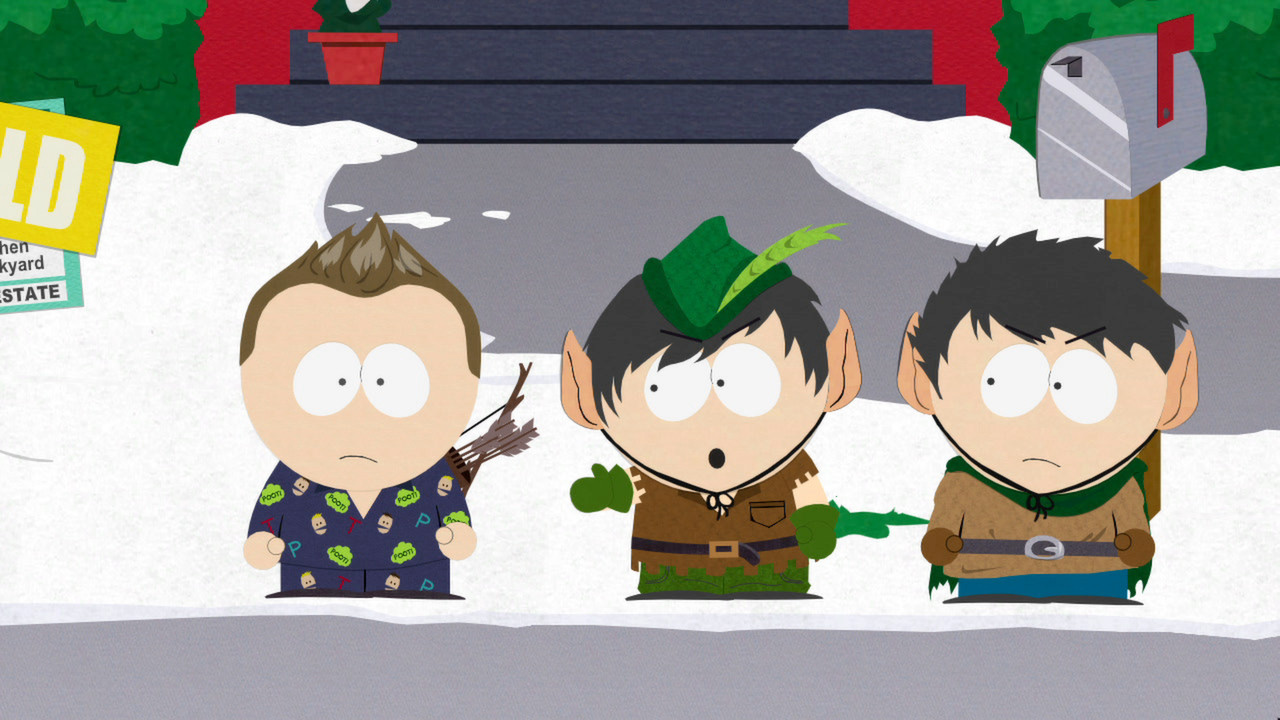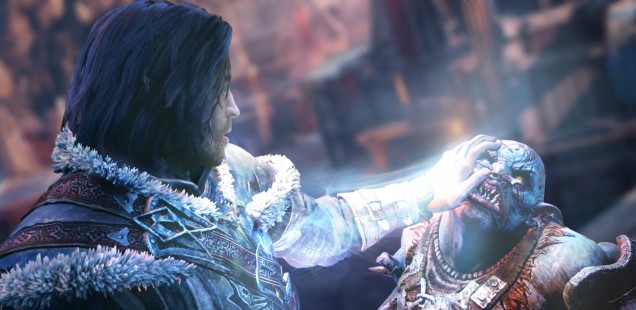
Games of 2014 (10/15)
Middle-Earth: Shadow of Mordor, Dragon Age: Inquisition, Wolfenstein: The New Order, Final Fantasy XIII: Lightning Returns, and South Park: The Stick of Truth in today’s assortment of games sporting colons in their title.
Middle-Earth: Shadow of Mordor
Everywhere you turn in Shadow of Mordor, you see the trappings of yet another bloated triple A title: it’s set in the backyard of a big movie franchise, it advertises DLC to you right in the main menu, and, of course, it makes you climb an assortment of towers to unlock new areas of a minimap littered with distractions: elven murals, audiologs, runes, challenges, side missions.
Beneath the gleam and polish, however, Shadow of Mordor hides a raw, chaotic spirit that has become all too rare for these tightly choreographed big-budget titles. The most interesting part of the game is its simulation of the hierarchy of your enemies through a changing roster of orc captains – all with unique and randomly distributed strengths and weaknesses – that grow in power, move up the ranks, challenge and kill each other, even as you’re dispatching them.
The constantly shifting power dynamics are fascinating to watch, even if the goals of this system end up contradicting the purpose of the game. Shadow of Mordor gives these orcs personalities, ambitions and fears, shows you how the trappings of their – admittedly very brutal – culture, and then asks you to revel in ramming your blade down their neck and cartwheeling over them in one smoothly animated sequence. If that makes you feel queasy, wait until you get to enslave them by turning them into mindless drones instead!
As questionable as your role in these struggles may be, Shadow of Mordor remains a fascinating world to move through for a time. Just goes to show that even the most ridiculous of emergent narratives – like an inept captain with a funny name falling up the ranks – tends to trump the scripted stories games provide for us, particularly when they concern yet another angry guy with a dead family looking for revenge.
Joe Köller is the current Editor-in-Chief of Haywire Magazine, German correspondent for Critical Distance, and irregular contributor to German sites such as Video Game Tourism, Superlevel, and WASD. You can follow him on Twitter, and support him on Patreon.
Dragon Age: Inquisition
What makes Dragon Age: Inquisition my game of the year? Not the graphics. They are adequate for a current generation game, but don’t surpass any standards. Not the gameplay. It has improved since Dragon Age: Origins, but honestly, not that much. Not the story either. You are supposed to restore order in a world torn apart by civil wars. What novelty.
No. What makes Dragon Age: Inquisition my game of the year is its characters. Simple.
There has never been a game as diverse and open-minded as this. There is no default Inquisitor. You are the Inquisition, you are important, no matter who you are or what you look like. You want to be a badass giant beating up everyone and everything? Sure. You want to experience a virtual relationship with the most interesting videogame characters ever brought to screens? Go ahead. You just want to fetch quest the hell out of Thedas? No one is going to stop you.
Dragon Age: Inquisition answered all the questions I have been asking myself last year.
Me: Why are there no strong female antagonists in videogames?
Dragon Age: Did you sleep through the previous Dragon Age games? Flemeth has been in almost all of them!
Me: Why are women harder to animate?
Dragon Age: They’re not. If you’re looking only at their movement, humans are not that different from each other at all.
Me: Where are equality, political correctness and respect for people of all genders in videogames?
Dragon Age: Why don’t you enter my world, which is ruled by female and male regents alike, and learn more about Empress Celene, Mercenary Krem, Spirit Cole, The Iron Bull, Dorian or Solas? Have fun.
Sarah Geser is a Swiss person living in Hamburg who used to work for Nintendo, Activision and THQ, as well as several German TV shows and magazines about videogames and movies. She reads, listens, and watches the shit out of anything and sometimes comments on things on her blog or on Twitter.
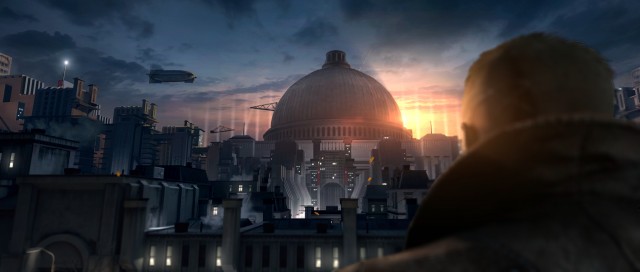 Wolfenstein: The New Order
Wolfenstein: The New Order
Who could have guessed that a remake of one of the oldest first-person shooters would also offer the most heart in a triple A game of 2014? Wolfenstein: The New Order was set to be yet another remake in a franchise made up of more remakes than entries, and nothing else. It had a mostly quiet buildup and a fairly quiet release, so I didn’t expect much of it. Imagine my surprise when I discovered that not only was this game packed full of action, explosives, and an engaging alternate history plot, but also surprising acts of humanity and incredibly three-dimensional characters.
Wolfenstein takes place in an alternate 1960s, one where the Nazis won the Second World War with the help of a mad genius named General Deathshead. The resistance force you fight alongside of is filled with an emotionally diverse cast of characters, who all have their own reasons for fighting and clinging to life. Missions are broken up with transition scenes, where you get to wander their base of operations and interact with inhabitants. It offers some respite from the hell waiting for you in the world and allows you to engage with the supporting cast of characters.
The gameplay itself is thrilling, and the game is designed to take you to different modes of play. Sneaking around with a knife can easily transition to no-holds-barred firefights, explosions rocking the environment, with you in the center, dual-wielding shotguns and shooting down hordes of enemies.
So much has been done to build this totalitarian and frightening world. Newspaper clippings tell you of the war and how it was lost. Letters and notes scattered about speak of the horrors that people experience on a daily basis. You can even find records of classic songs, remade to serve the Nazi Empire. On its face, Wolfenstein seems like just another shooter, and while it is that (and a very good one, too), it offers much more as well. It offers morality, emotion, and heart, and it is definitely a game worth playing.
Bryce Duzan is a writer, journalist, and analog game designer. He can be found on Twitter.
Final Fantasy XIII: Lightning Returns
There is a sidequest in Lightning Returns in which the player-as-Lightning-as-Christ analogue must find and collect colored chicks to restore a Mardi Gras dancer to her original giant-chicken form; at which time her soul will be added to Lightning’s pool of magical power and she can fulfill her dream of performing an adorable chicken dance every time the player walks by. That doesn’t need to make sense, it just needs to make you chuckle or roll your eyes. If you’ve done the former, expect a silly game about swordfighting, dress-up and man’s uncertainty in a temporary, godless universe.
I could drone on about the series’ or the genre’s lost identity, but I’d rather sprint through gothic-noir streets and tranquil moonlit deserts. Thanks though. Lightning Returns let me laugh at myself and sneer down my nose at its bright colors and spectacular nonsense just long enough to miss that I’ve been taking it seriously all along. Even though Lightning Returns just aches to be your guilty-pleasure of the year, it finds that sweet spot between fun and nuance. Make no mistake, it is deeply invested in spectacle and camp, but somehow it manages, in spite of itself, to convey a surprising level of complexity.
Set in a world of immortals bracing for the end of days, Lightning Returns forces the player to grow through human contact. Sure, most of that contact involves body-swapping cats and woebegone chefs looking to make the perfect meal, but even with such an absurd tone, it maintains its themes. It’s Lightning’s personal journey as grumpy badass through Alice’s Wonderland, it’s Trinity from The Matrix lost in Terry Gilliam’s Adventures of Baron Munchausen. It’s mixed up, surreal, over-the-top and it tells all the haters exactly where they can go.
It’s the kind of game that knows exactly what it wants to say, how it wants to say it and who it wants to say it to. I’m glad that Final Fantasy hasn’t read its obituary yet.
Mark Filipowich is the co-coordinator of the Blogs of the Round Table feature at Critical Distance and the curator for Good Games Writing. His worked has appeared in PopMatters, The Border House, The Ontological Geek and many other fine virtual games locales. He has a sweet blog called bigtallwords and he tweets irregularly and irreverently at @MarkFilipowich.
South Park: The Stick of Truth
Here’s a game that looks and feels like the South Park cartoons. Early South Park, that is, with a lot of poop jokes, not today’s highly topical, every-side-is-wrong political commentary South Park. It’s a somewhat fun mockery of RPGs, but what’s more interesting than its parody or its perspective – that of kids in a LARP gone out of control – is how it launched in Germany.
One day before the game’s release, Ubisoft stopped shipping copies here. Steam blocked the installation of already redeemed codes. Why the sudden change? In Germany, there’s a law against the “use of symbols of unconstitutional organisations”. It’s meant mainly to outlaw everything supporting Nazism, so Germans can’t ever again unite under the swastika to conquer the world. There are exceptions to this law: it’s legal to show Nazi symbols in education, sciences, art, in reporting of history or current events, and in any action against the ideology.
You might find this confusing. It is. The game is an example how the law is used against its purpose. In The Stick of Truth you fight Alien-Nazi-Zombies, that in some scenes are also cows. They wear Nazi uniforms with the swastika armlet, do the Nazi salute and in the uncensored version they speak in samples from a Hitler speech. They are ridiculous caricatures that no reasonable person would see as a role model. Showing Nazi-Symbols in a parody is completely legal in Germany, and there are comics and movies who do this. Yet Ubisoft delayed the release to make sure that black bars covered the symbols and the Zombie’s voices were exchanged.
Why? Because game publishers are chickens that didn’t yet push to set a precedent to decide if games are on the same level as movies or comics. Thanks to them not wanting to risk some money on a court case, now we’re stuck with the absurd situation of Neo-Nazis legally marching in streets – if they hide their swastika tattoo – while you can’t throw poop on a rotting Nazi-cow from space in a videogame.
Benedikt Frank writes for the German videogame bookzine WASD.
